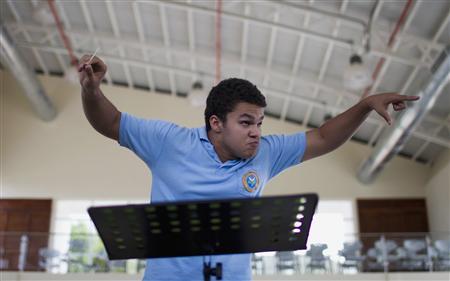(Reuters) – At 2 years old, he was given his first musical instrument: a “cuatro,” or small four-string guitar. At 8, he cried with emotion at a brass band concert.

Now, at just 14, Jose Angel Salazar is Venezuela’s youngest orchestra conductor – the latest prodigy from his nation’s famed El Sistema (The System) music development program – and possibly the youngest in the world.
Since the mid-1970s El Sistema has taught hundreds of thousands of youths, many from impoverished homes in Venezuela’s tough slums, to play in orchestras. Supporters say it gives them discipline, cuts truancy and boosts self-esteem.
“For a boy of 14 to be conducting an orchestra at the same time as going to school is a miracle that only happens in Venezuela,” Salazar told Reuters in an interview last week on Margarita, the Caribbean island where he was born.
The teenager, who delights in the complex symphonies of Franz Schubert and overtures by Antonio Vivaldi, is the second of three siblings raised by two local schoolteachers.
At a concert that night, the other musicians applauded him warmly as he took the stage to conduct 40 other youngsters, many of them older than him. Smiling shyly, he raised his baton and silence fell before the first notes rang out.
After two pieces, he received a long standing ovation, with his proud family looking on from a private box.
Jose Antonio Abreu, a local pianist, politician and economics professor, founded El Sistema in 1975 to get poor youngsters off the street, especially in shantytown “barrios” with some of the highest murder rates in the world, by offering them a classical musical education focused on ensemble playing.
Today, it is made up of 180 orchestras and about 350,000 youths, some 2,000 of whom recently flooded the Caracas metro to play in a simultaneous concerts at 23 stations.
Its most well-known alumnus is 31-year-old Gustavo Dudamel, who is now director of the Los Angeles Philharmonic and shot to rock-star levels of fame after leading Venezuela’s Simon Bolivar Youth Orchestra at rapturously received concerts worldwide.
Another prodigy is Edicson Ruiz, who at 17 became the youngest musician to join the Berlin Philharmonic.
Youth orchestras inspired by Abreu’s methods are being set up in places including Los Angeles, Scotland and Spain.
GLOBAL AMBITION
Salazar, who spoke to Reuters between rehearsals while wearing his high school uniform – a pale blue polo shirt, says he too hopes to travel the world one day, thanks to music.
In preparation, he said he plans to study languages after he leaves school in two years’ time. And, as a fan of Schubert, he says he will start with German.
His love of Schubert, and classical music in general, began when he was age 8 and he saw a concert in Margarita by a local brass band with a trumpet player from the Berlin Philharmonic.
“I wanted to play the trumpet. … I remember crying three times because of the impression the music made on me,” he said.
He soon gave up karate lessons in favor of his new passion.
He began by learning the recorder, which all initiates to El Sistema are taught, and then the violin. He excelled at that instrument and was soon named as a concertmaster – or the leader of the first violin section of the orchestra.
Salazar, who also plays the guitar and the “cuatro,” said the first time he directed the orchestra it was spontaneous.
“I was playing (the violin) and there was a teachers’ meeting so our teacher had to leave. Since no one was left in charge, I put down the violin and began to conduct,” he said with a smile.
Before long, Salazar was conducting boys twice his age, but always under the watchful eye of his teacher, Felipe Izcaray.
His life has changed a lot. After school he runs, without changing his uniform, to rehearse late into the night. It is only during the weekends when there are no concerts that he has something resembling a normal teenage life with his friends.
One day, he dreams of conducting at New York’s storied Carnegie Hall, or the Bolshoi Theater in Moscow.
“I want to continue developing myself so that in the future I can pass on the gifts that I’m receiving now,” Salazar said.
(Editing by Daniel Wallis and Will Dunham)



